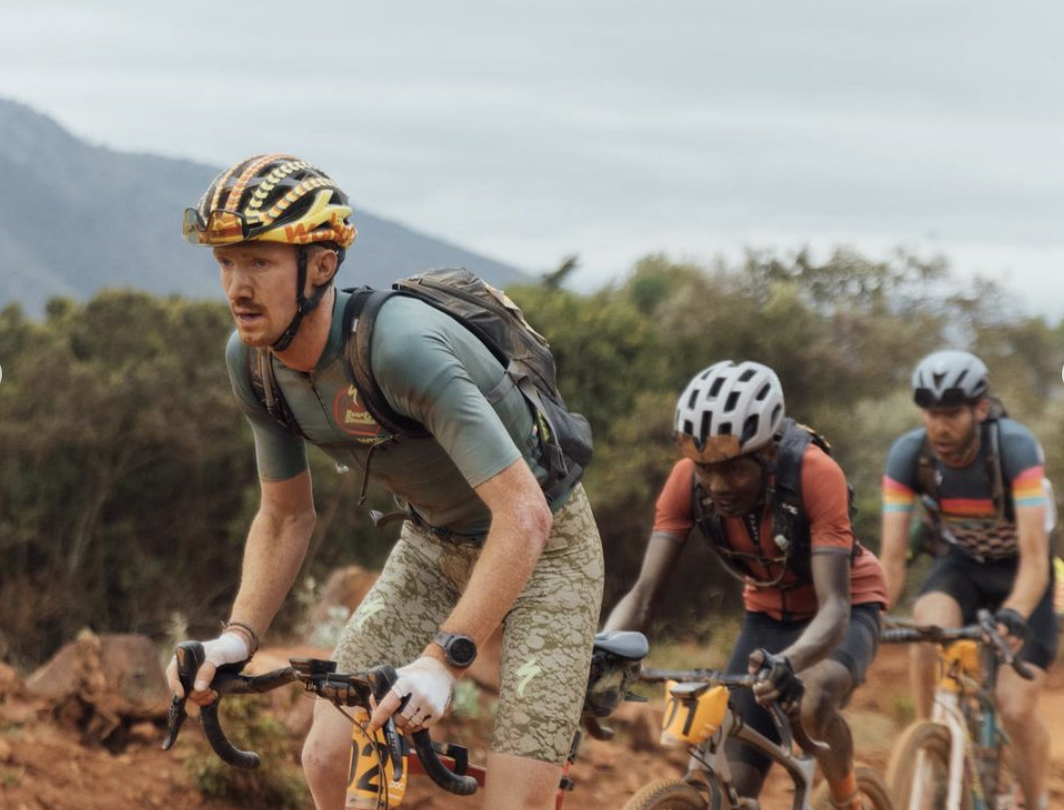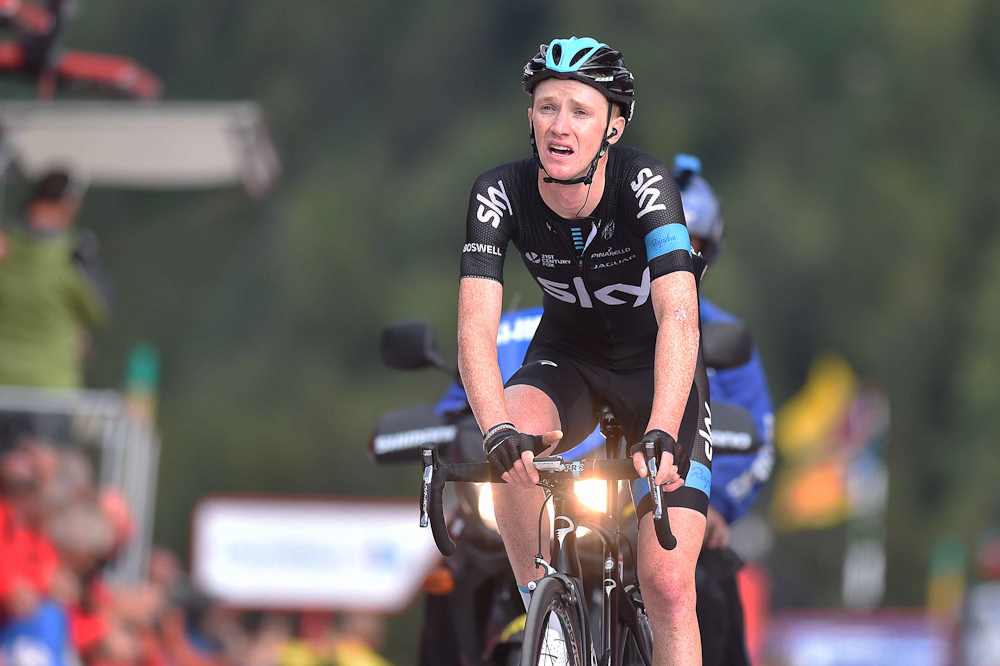Ian Boswell: Inclusion and acceptance ultimately benefit cycling
American gravel rider on rediscovering the jo♚🐭y of cycling and spreading awareness

A decade ago, 168澳洲5最新开奖结果:Ian Boswell was one of the most exciting young riders on the American road circuit, with a WorldTour contract on the horizon and a childhood dream of racing the 168澳洲5最新开奖结果:Tour de France.
That dream became a reality in 2018 but, less than a year later, the 30-year-old 168澳洲5最新开奖结果:stepped away from elite road racing after a career-ꦍaltering cras🍌h left him with a severe concussion.
For the majority of riders, that would have represented the end of t🍌he line but Boswell has reinvented himself as one of the leading male gravel riders in North America and, what’s more, he’s riding not just for himself, but for individuals and communities that he feels passionate about.
He has been inspired by those arou♓nd him ꧂and he's channeling that inspiration into providing opportunities and awareness for those that need them most.
Boswell is in the UK when we meet. He’s here for the Rouleur Live event in London but, after a whirlwind gravel season, there’s a lot to unpack – from his monumental win at Unbound Gravel to his support for developing riders in Ke♔nya and raising a♛wareness for the transgender community.
"It’s all been very unexpected in terms of the performances that I had and♍ the attention that gravel has received," the 30-year-old s⛦ays when asked about his 2021 season.
"It’s blown me away. It all happened so quickly and it was so much bigger than I expectedඣ. It was unique in that I did a season of racing with seven races, which, compared to the WorldTour would have seen me away maybe 150 days a year with racing and team camps included. I did just seven races, but I found it incredibly successful and a lot of fun."
The latest race content, interviews🍷, features, reviews and expert buying guides, d⛄irect to your inbox!
Fun is a huge priority for Boswell these days. His WorldTour career certainly had its highlights but it ultimately came at a price, with pressure and expectation constantly hanging over him𝕴.
Retiring and then spending a🍷 year𓄧 out of competition due to the pandemic essentially created the space for Boswell to take a step back, reprioritize what he wanted from a work-life balance, and get back to the essence of why he fell in love with riding his bike in the first place.
"The biggest difference now is the freedom," he📖 explains.
"I had tಌhat ti🌊me to rediscover the joy of riding my bike. I obviously try and ride hard and push as much as I can but, with so many other things going on, I realise that it’s now a privilege to go out and ride.
"My crash in 2019, while it wasn’t life-threatening, provided a very quick realisation that my career could be over very quickly, and I thought it was over. But during the pandemic I rediscovered my love for just riding m♑y bike, and how much I love the process before the racing. I love the process of training and riding. With gravel, I get more time to do what I love, which is the riding."
The barometer of success
Within the WorldTour, life for bot🐎h a male or female rider comes down to structure and compliance. You’re told when to race, how to race, and who you are racing for.
Individualism and personality – more so on the men’s side – can be stifled, with꧟ compe꧑titiveness and a tunnel-vision approach to performance reinforced throughout.
"In the WorldTour it’s less abouಌt winning and more about fulfilling your role to get a new contract. You’re constantly chasing something," Boswell says.
"How many riders win a WorldTour race? It&rsq🎃uo;s just a few. So your goal is to basically please the team enough to continue with you or find a team to pick 🎀you up. Of course, you want to perform well but there’s still this constant stress."

These days, Boswell can not only pick and choose his race calendar but he can select the partners he wants to promote, and while he also holds down a job at Wahoo, he has the capacity and space to decide🦩ﷺ on the path his career now takes.
He’s agent, team boss, athlete, and logistical manager, all in one. As a result, the definition o🅘f succ💜ess has changed drastically, and for the better.
"The barometer for ♕success has changed a lot for me now. Of course, I want to do well but, more importantly, my goals have shifted," Boswell says.
"First and foremost, I don’t want to crash, so I take it easy in the technical sections and then have fun while doing it, but the ultimate barometer of success is finishing the day and knowing that I had an awesome day out there. Even at SBT, where I finished second behind Alex Howes, that was such a fun race. I didn’t care that I didn’t win.
"We started with 🧜2,000 people and slowly it was whittled down to just three of us at the finish, with Pete Stetina there, too. Everyone pulled equally and we sprinted at the end. People asked if I was disap🦂pointed to finish second but I really wasn’t. Alex was faster than me but I had a great day.
"I’m no longer measuring myself and my success on other people. I’m measuring it off my experiences on a bike. In a WorldTour team that’s tough because you have the team’s expectations of yo🐲u.♚ Now the expectations are purely my own, and while winning is great, there’s nothing more rewarding than having a great day on the bike."
Platform
Perhaps one of the standout elements to Boswell&🌜rsquo;s racing these days is his decision to use his platform for broader goals than just his own athletic success.
In June, he took part in the Migration Race in Kenya and spent his time there riding with communities, racing, and shari♚ng his experiences 🐓with riders of all levels. He and Wahoo planned for a number of the Kenyan riders to travel to the US during the year but visa issues scuppered their hopes. However, the time in Kenya demonstrated why cycling is for everyone.
Boswell realises that he has enjoyed ♊the benefits thaꦐt come with being a male rider in North America and Europe and he has taken on a responsibility to try and open up doors for riders who have just as much talent but simply haven’t had their chance yet.
"When I reflect on my career now, especially my road career, cycling has g💃reatly enhanced my life," he says.
"Whether it’s through the people I’ve met or the places that I’ve got to travel to, everything that’s come to me in life has come through cycling. It’s easy to reflect and think that I’ve worked h🙈ard and deserved it and, of course, if you excel you get rewarded, but there were a lot of people, federations, and teams that supported me along the way and it’s easy, when you’re in the sport, to just focus on yourself. So to have the opportunity now to help others who don’t have the opportunities that I had - because I was very lucky - whether it’s American riders, trans riders, or riders from East Africa, it’s ﷽important because ultimately everyone benefits If more people are included.
"I grew up as a kid in the US wanting to race the Tour de France and somehow, I got there, and I did that. It was more than I hoped ꦑI could achieve. The problem in life is what do you do when at 28 you’ve accomplished your childhood dream? Now I enjoy racing and riding, but I also think about how I can give that opportunity to others.
"For some people it’s about wanting to race the Tour, for others it’s about getting to the start line of Unbound, for some it’s about finding acceptance in the community because they feel marginalised. It’s really rewarding to raise other people’s voices. It’s someth🍌ing that I didn’t do when I was racing on the road because I was so focused on what I was doing."

With gravel, as Boswell and other riders have shown, having a platform and using it for the good of communiti♍es and individuals that need support is a vital sign of progressioꦏn that will hopefully lead to greater levels of parity and inclusion.
Gravel, as a discipline, seems ripeꦺ for providing the landscape for change. The discipline is well positioned and there are several riders and race organisers such as those behind Unbound, Rooted Vermont, and Stetina’s Paydirt that are bridging towards various levels of equality and parity.
For Boswell, supporting the transgender and LGBTQ community at large is a choice that comes with personal resonance. He has talked a🔯bout the fact that a member of his family recently talked to him about their trans identity and that it encouraged Boswell to read more and educate himself on the related topics.
"One of the cool things with gravel is that so many riders have a plꦡatform and a voice. We’re getting this attention and using it in a pos💜itive way to improve cycling," he says.
"I had the Trans Pride wristband on at Unbound and I ordered that myself, I wore it at races and passed out maybe 10 to 15 ofܫ them to other riders at the event. There are racers all over the US now wearing it and I saw a few riders on Legion who wore it at Into the Lion’s Den, which was super cool.
"I made this statement, which was very personal, but it spread to the larger cycling community, which is really ꦡawesome."
Daniel Benson was the Editor in Chief at gxiaoওwu.com between 2008 and 2022. Based in the UK, he joined the Cyclingnews team in 2008 as the site's first UK-based Managing Editor. In that time, he reported on over a dozen editions of the Tour de France, several World Championships, the Tour Down Under, Spring Classics, and ﷽the London 2012 Olympic Games. With the help of the excellent editorial team, he ran the coverage on Cyclingnews and has interviewed leading figures in the sport including UCI Presidents and Tour de France winners.
